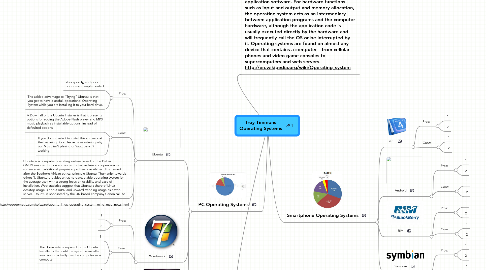
1. Operating System Definition- An operating system (OS) is software, consisting of programs and data, that runs on computers, manages computer hardware resources, and provides common services for execution of various application software. For hardware functions such as input and output and memory allocation, the operating system acts as an intermediary between application programs and the computer hardware, although the application code is usually executed directly by the hardware and will frequently call the OS or be interrupted by it. Operating systems are found on almost any device that contains a computer—from cellular phones and video game consoles to supercomputers and web servers. http://en.wikipedia.org/wiki/Operating_system
2. PC Operating Systems
2.1. Ubuntu
2.1.1. Pros:
2.1.1.1. Very speedy, and good boot design implemented
2.1.1.2. The added advantage to “Trying” Ubuntu is that you get to have a useful, operational Operating System while you are installing it to your hard drive.
2.1.2. Cons:
2.1.2.1. A Downfall of the Ubuntu Installer is that it presents options for adding the Adobe Flash player and MP3 music playback as installable options, instead of defaulted options
2.1.2.2. If you do not select to install this software at the begining, it can leave us wondering why our Music isn’t playing or Youtube isn’t working.
2.1.3. Ubuntu is a computer operating system based on the Debian GNU/Linux distribution and is distributed as free and open source software with additional proprietary software available. It is named after the Southern African ethical principle Ubuntu ("humanity towards others"). Ubuntu provides an up-to-date, stable operating system for the average user, with a strong focus on usability and ease of installation. Web statistics suggest that Ubuntu's share of Linux desktop usage is about 50%, and upward trending usage as a web server. Ubuntu is sponsored by the UK-based company Canonical Ltd.
2.1.4. http://gogeometry.com/software/ubuntu_linux_operating_system_mind_map_news.html
2.2. Windows 7
2.2.1. Pros:
2.2.1.1. 1
2.2.1.2. 2
2.2.2. Cons:
2.2.2.1. 1
2.2.2.2. The down side compared to the Ubuntu Installer is that until the system is installed, you cannot actually use the computer as a computer
2.3. Mac OS X
2.3.1. Pros:
2.3.1.1. 1
2.3.1.2. 2
2.3.2. Cons:
2.3.2.1. 1
2.3.2.2. 2
3. Sources 2011
4. Smartphone Operating Systems
4.1. iOS
4.1.1. Pros:
4.1.1.1. 1
4.1.1.2. 2
4.1.2. Cons:
4.1.2.1. 1
4.1.2.2. 2
4.2. Android
4.2.1. Pros:
4.2.1.1. 1
4.2.1.2. 2
4.2.2. Cons:
4.2.2.1. 1
4.2.2.2. 2
4.3. RIM
4.3.1. Pros:
4.3.1.1. 1
4.3.1.2. 2
4.3.2. Cons:
4.3.2.1. 1
4.3.2.2. 2
4.4. Symbian
4.4.1. Pros:
4.4.1.1. 1
4.4.1.2. 2
4.4.2. Cons:
4.4.2.1. 1
4.4.2.2. 2
